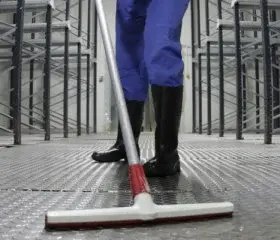/109592899-1600x400.jpg?width=300&name=109592899-1600x400.jpg)
Are your workplace amenities compliant?
You need to consider the following four areas:
Dining facilities (such as a cafeteria or dining area) should be provided. They can be internal or external to your facility, and should be equipped with tables, chairs, washing facilities, boiling water, etc.
Records should also be kept and made available to personnel involved in preparing or serving food, of any worker or other personnel on site with food allergies, sensitivities or intolerances, including the specific foods such persons should avoid.
Where required, hand-washing facilities (in addition to lavatories) should be provided for workers’ use. In dusty or dirty work environments, showers (separate for males and females) should also be provided and, if required, decontamination facilities.
There are legislative provisions and codes of practice requirements for lavatories of which you should be in compliance with. Change rooms (separate for males and females) may also have to be provided depending on the circumstances.
Drinking water should be provided at various locations around your site (at least one for every 40 persons). Workers in hot conditions need to be supplied with cool drinking water.
Where it is necessary to transport drinking water to personnel (e.g. to temporary sites, construction sites, etc.), the following arrangements should be put in place to ensure the water is safe and suitable for human consumption:
- be procured from an approved supplier (e.g. a water supply authority)
- water transport vehicle should be of the correct type (i.e. vehicles, containers and fittings used for carting reclaimed water, chemicals, non-food liquids, waste, etc., should not be used and all others should be thoroughly cleaned and sanitised before use);
- vehicles should be fitted with a ‘Drinking Water’ sign; and
- arrangements should be in place for emergencies, as appropriate.
Download Your Free Checklist PDF
Get instant access to our expert-designed checklist to help you. Simply fill out the form below to download your copy.SIMILAR READINGS

2 min read
2 min read
Air quality is critical to human performance. Breathe easy with these measures....
Read More
1 min read
1 min read
Effective housekeeping can reduce and remove many commonplace risks to your employees and business....
Read More
2 min read
2 min read
Don’t leave your employees out in the cold – manage their working conditions properly...
Read More
